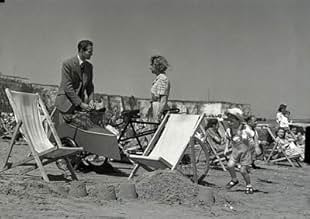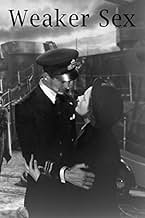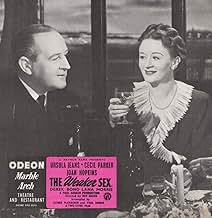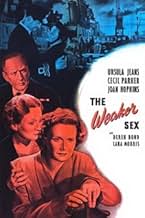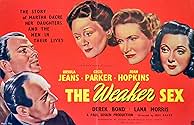A mother struggles to maintain normalcy at home as D-Day nears. With lodgers, absent children in the Navy, and no war job, she questions her choice to remain a housewife when her son's ship ... Read allA mother struggles to maintain normalcy at home as D-Day nears. With lodgers, absent children in the Navy, and no war job, she questions her choice to remain a housewife when her son's ship is damaged.A mother struggles to maintain normalcy at home as D-Day nears. With lodgers, absent children in the Navy, and no war job, she questions her choice to remain a housewife when her son's ship is damaged.
- Awards
- 2 wins total
Basil Appleby
- Seaman Taylor
- (uncredited)
Clement Attlee
- Self
- (archive footage)
- (uncredited)
Dorothy Bramhall
- Mrs. Maling
- (uncredited)
Winston Churchill
- Self
- (archive footage)
- (uncredited)
Helen Goss
- Woman in Silk Stockings Queue
- (uncredited)
Featured reviews
This is what the war years British film industry excelled at. Ursula Jeans and Cecil Parker are a widow and friend of the late husband and her assorted adult children and relatives. The action of the film starts with Mrs. Dacre (Jeans) being given a fresh hen by a random soldier-which might be stolen. Parker is seen vacuuming the floor. War has switched their roles. Their growing friendship is nice to watch. Mrs. Dacre's sister is directly involved in the war so has the luxury of a free uniform, and they frequently clash. A son and daughter are in uniform too. The small issues set the restrained tone, not unlike Mrs. Miniver and Since You Went Away. But inevitably the war and DDay inflict a series of tragic events onto the people connected to Mrs. Dacre.
Now that the last of this generation is down to a few, films such as these will become more important as a cultural record.
If you have any interest in home front history, you'll enjoy this. I found it remarkably moving. The action sequences are terrific and the sets help to remind us how we live in relative luxury compared to life during wartime.
Definitely recommend.
Now that the last of this generation is down to a few, films such as these will become more important as a cultural record.
If you have any interest in home front history, you'll enjoy this. I found it remarkably moving. The action sequences are terrific and the sets help to remind us how we live in relative luxury compared to life during wartime.
Definitely recommend.
This movie could easily have been an unmitigated disaster -- no plot to speak of, not much in the way of memorable dialog, the uneasy feeling a viewer has nowadays that it's all a great big stiff-upper-lip and tally-ho-for-rationing exercise. What saves it is the transcendent acting -- lines spoken so perfectly, body movements so in sync with the spirit of the situations -- and a sure sense of editing that keeps the story (slim pickins as it is) moving. So what have we here, after all's said and done? I think we've been given a good postcard for future generations, a card which says, "Yes, this is how it was; this is how we got through it all. We behaved well toward one another, and we all came out of it all right." I often stop movies to take breaks if they seem a little long-ish. This one played right through to the end, and I was sorry to see it finish. I could have spent much more time with these lovely people.
"The Weaker Sex" is two things. Firstly it is a tribute to the British housewife ("To those who also served, though they were too busy to stand and wait"). Secondly it is a look at contemporary (1948) history through the eyes of a middle-aged housewife.
Though both these goals are admirable, the way they were carried out made a lopsided and rambling film. The first half of the picture, which takes place from D-Day to VE Night, shows a family under the stress of war. The incidents which fill this part of "The Weaker Sex" - air raids, lost and wounded brothers and sons, D-Day landings - are exciting enough to mask the fact that there isn't really any overarching plot, and the characters are going nowhere.
However the second half of the movie, which takes place in the postwar "Age of Austerity" doesn't have this built-in excitement factor. While watching a family coping with peace and the aftermath of war should have been interesting, if only for the novelty value, this half of the picture felt like an epilogue to the real movie. It is possible, even probable, that real life felt like this after the war, but sometimes reality doesn't
Perhaps there was a third purpose behind this movie. On the whole all the characters in "The Weaker Sex" are nice people: decent, doing their duty, law abiding, and not inclined to grumble. Given the era it was made in, it was perhaps intended to boost morale by reminding people how lucky they really were - that though times were hard they had peace, freedom and hope for the future.
Though both these goals are admirable, the way they were carried out made a lopsided and rambling film. The first half of the picture, which takes place from D-Day to VE Night, shows a family under the stress of war. The incidents which fill this part of "The Weaker Sex" - air raids, lost and wounded brothers and sons, D-Day landings - are exciting enough to mask the fact that there isn't really any overarching plot, and the characters are going nowhere.
However the second half of the movie, which takes place in the postwar "Age of Austerity" doesn't have this built-in excitement factor. While watching a family coping with peace and the aftermath of war should have been interesting, if only for the novelty value, this half of the picture felt like an epilogue to the real movie. It is possible, even probable, that real life felt like this after the war, but sometimes reality doesn't
Perhaps there was a third purpose behind this movie. On the whole all the characters in "The Weaker Sex" are nice people: decent, doing their duty, law abiding, and not inclined to grumble. Given the era it was made in, it was perhaps intended to boost morale by reminding people how lucky they really were - that though times were hard they had peace, freedom and hope for the future.
This is rather a strange film with an even stranger title.The film has a substantial amount of newsreel film intercut with the drama.Also there are newspaper headlines shown often when they seem to be of little dramatic point.Cecil Parker and Thora Bird steal the acting honours.I do wonder what contemporary audiences would have made of this film.Particularly being reminded of the austerity that everyone was having to suffer.Films like this were far better made during the war.
The cast and crew were some of the best British movies had to offer. This moving tale of what it was like in England in and just after the war years. I really enjoyed Thora Herd as the ever reliable Char lady, chatting all the time with nothing to say she was perfect. Cecil Parker who was head over heels in love with delightful Ursula Jeans but did not have the nerve to tell her till 2/3rds through the film, very English. The trivia was exactly right. A real who's who in the British film industry. Roy Baker directing, Vetchinsky art direction and Hillier a master of black and white photography. Miur Mathieson, music Seeing this 1948 movie for the 1st time in 2004, I was prepared to be disappointed but was not.
Did you know
- TriviaMartha Dacre quotes from "Life a duty" by Ellen Sturgis Hooper (February 17, 1812 - November 3, 1848): "I slept, and dreamed that life was Beauty; / I woke, and found that life was Duty."
- Crazy creditsOpening credits prologue: The story of Martha Dacre and her family covered the period of four years from D-Day onwards . . .
It might have been your story.
- ConnectionsReferenced in The Good Life: The Weaker Sex? (1975)
- SoundtracksThese Foolish Things (Remind Me of You)
(uncredited)
Written (1936) by Eric Maschwitz and Jack Strachey
Sung by Cecil Parker in opening scene
Details
- Runtime1 hour 24 minutes
- Color
- Aspect ratio
- 1.37 : 1
Contribute to this page
Suggest an edit or add missing content


